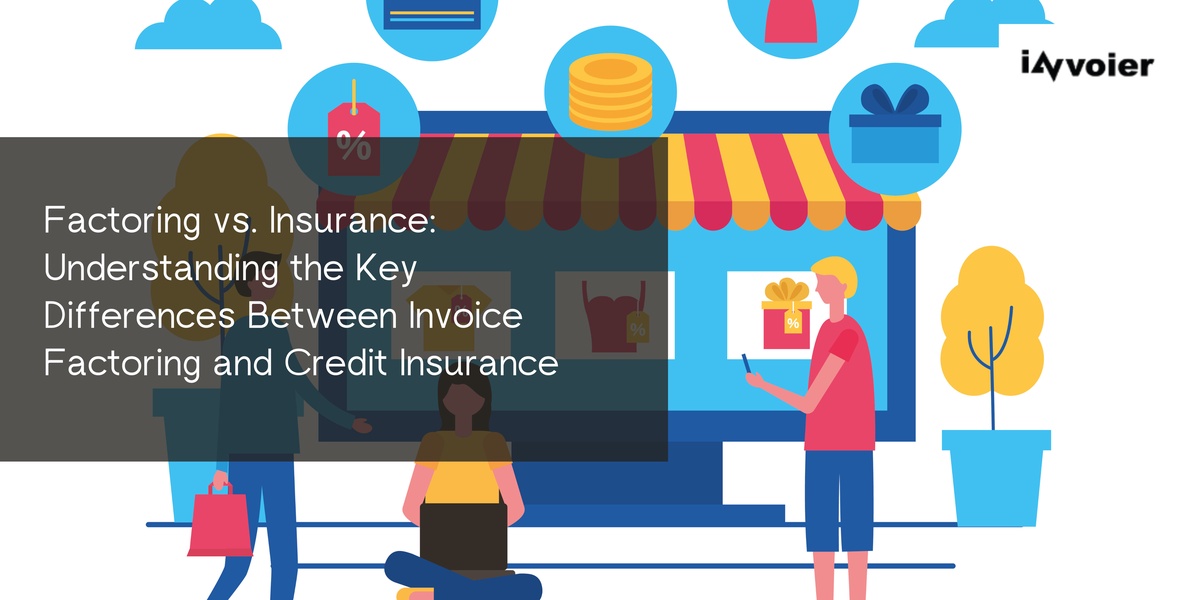As a business owner, you want to find ways to safeguard your company's financial stability. To protect your cash flow, two options that might come to mind are invoice factoring and credit insurance. Although both approaches can help you manage risk, they differ significantly. The difference lies mainly in how they work and the benefits they can offer.
That's why it's essential to understand the key differences between factoring and insurance. It will help you determine which solution is right for your business. In this article, we'll take a closer look at factoring vs. insurance. In addition, we will also be exploring the pros and cons of each approach and how they can impact your bottom line.

What Is Invoice Factoring?
Invoice factoring is a financing option for businesses needing quick cash access. With invoice factoring, a business sells its outstanding invoices to a factoring company at a discounted rate. In return, the factoring company provides the industry with a cash advance, typically between 70% and 90% of the total value of the invoices. Once the factoring company receives customer payment, it reimburses the business for the remaining balance minus a factoring fee.
One of the key benefits of invoice factoring is that it provides businesses with immediate access to cash, helping them maintain a healthy cash flow.
What Is Credit Insurance?
Credit insurance, a type of insurance, protects businesses against the risk of non-payment by their customers. With credit insurance, a business pays a premium to an insurance company in exchange for coverage against losses due to customer insolvency or default. If a customer fails to deliver an outstanding invoice, the business can file a claim with the insurance company. Once the claim is proven, they can receive compensation for the losses incurred.
How Does Invoice Factoring Work?
To understand how invoice factoring works, let's look at an example. Say a business has $100,000 in outstanding invoices due in 60 days. The business decides to work with a factoring company, which offers to buy the invoices for a discounted rate of 85%.
The factoring company provides the industry with a cash advance of $85,000 (85% of $100,000) minus a factoring fee of 3%. The factoring company then collects the outstanding invoices from the customers and reimburses the business for the remaining balance, minus the factoring fee.
Invoice factoring provides businesses with immediate access to cash. Companies can use this cash flow to cover expenses or invest in growth opportunities. Additionally, factoring can help companies to save the time they must wait for customers to pay their outstanding invoices.
How Does Credit Insurance Work?
To understand how credit insurance works, let's look at an example. Say a business has $1 million in sales to a customer and decides to purchase credit insurance with a premium of 1%. If the customer defaults on the payment, the business can file a claim with the insurance company to receive compensation for the losses incurred, up to the insured amount of $1 million.
One of the benefits of credit insurance is that it protects businesses against the risk of customer non-payment. It can help them manage risk and maintain financial stability. Credit insurance can also help businesses secure financing, as lenders may be more willing to lend to companies with insurance coverage. However, credit insurance can be expensive, and exclusions and deductibles may limit coverage.
Key Differences Between Factoring And Insurance
Although factoring and insurance can help businesses manage risk, they differ in several ways. For one, factoring provides businesses with immediate access to cash, while credit insurance protects against the risk of customer non-payment. Additionally, factoring can be more expensive than credit insurance, as some companies charge a fee for their services. Finally, some customers may view factoring negatively, while credit insurance is generally considered a standard business practice.
Advantages of Factoring over Insurance
One of the main advantages of factoring over credit insurance is that it provides businesses with immediate access to cash. It can benefit businesses with long payment terms or experiencing cash flow problems. Additionally, factoring can offer a good option for businesses with a high volume of outstanding invoices. It allows them to outsource the collection process to the factoring company.
Another advantage of factoring is that it can be easier to obtain than credit insurance. Factoring companies typically only require businesses to have a certain level of outstanding invoices. On the other hand, credit insurance may require businesses to undergo a more rigorous underwriting process.
When to use Factoring and When to Use Insurance
Determining whether to use factoring or credit insurance depends on several factors. The factors can include:
- The business's cash flow needs.
- The level of threat associated with the customer base.
- The cost of each option.
Factoring may be a good option for businesses needing immediate cash access or having many outstanding invoices. Additionally, factoring can be a good option for companies with difficulty collecting unpaid invoices or a high volume of customers.
Credit insurance may be a good option for businesses that operate in industries with high levels of risk or have a large number of customers. Credit insurance also helps companies to protect themselves against the risk of customer non-payment.
Conclusion
In conclusion, invoice factoring and credit insurance are two options businesses can use to manage risk and protect their cash flow. Although both approaches have pros and cons, they differ significantly in how they work and the benefits they can offer.
By understanding the key differences between factoring and insurance and when to use each option, businesses can make informed decisions about managing their receivables and maintaining financial stability.
Whether you're a small business owner or an appointed enterprise, it's important to consider all your financing options and choose the right one for your business.


No comments yet